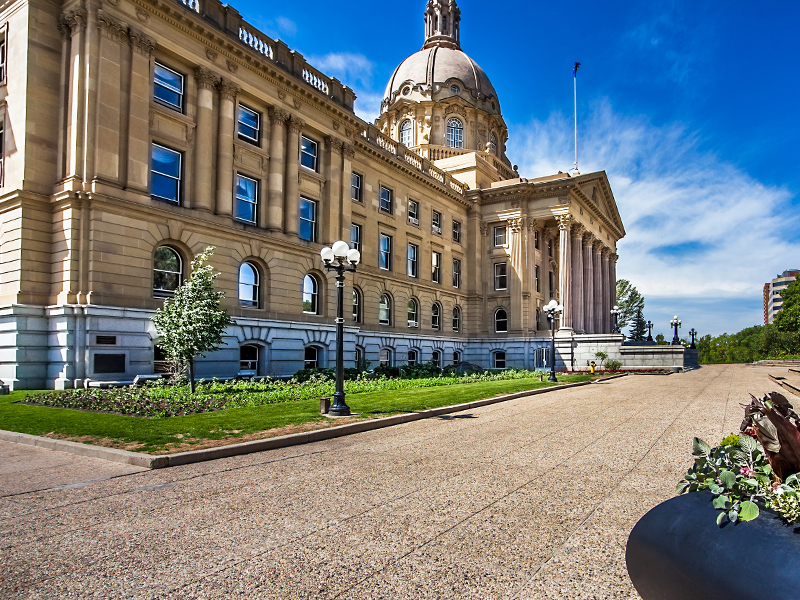
The Alberta legislature resumed Monday with promises of a referendum on tax increases and more threats to unsheathe a law that the United Conservative Party government says defends the province from federal overreach.
“There will be no new taxes or increases in personal or business taxes in this province without approval by Albertans in a referendum,” said the text of the speech from the throne, the first since the UCP under Premier Danielle Smith won the May election.
The throne speech delivered by Lt.-Gov Salma Lakhani is meant to give a broad outline of the government’s goals and priorities.
But Opposition New Democrat Leader Rachel Notley said the speech was full of gimmicks and new uncertainties.
“We need to make grown-up plans,” she said. “Danielle Smith is more interested in setting up fights.”
The first bill would amend current legislation that prevents the introduction of a sales tax without a referendum. The new law, to be introduced later Monday, would expand that to include increases to personal and corporate taxes, as well as changes to tax brackets or credits.
Smith told reporters the move would pay off in business certainty, new investment and increased taxes down the road.
“When you create an environment when people want to come here and start businesses, you actually start to benefit from tax cuts,” she said.
The government has also promised measures to reduce the cost of living, including a new tax bracket for people earning less than $60,000, that it says would cut their taxes by $750 a year.
Notley said the bill will lock Alberta into its familiar cycle of free-spending budgets when oil prices are good and restraint when they’re not.
“It chains Alberta to the revenue roller-coaster,” she said.
Notley also said there are many ways government policy can raise the cost of living without increasing taxes and the UCP have hit many of them.
Tuition, electricity and insurance have all skyrocketed, she said.
“There are hundreds of other ways to tax Albertans which they’ve already been doing by downloading more and more costs onto regular families.”
The government is also to extend a break on fuel taxes until the end of the year.
The speech also has promised reforms to the province’s electricity market, which has the highest prices in the country.
“The market for electricity is clearly broken,” Smith told a news conference ahead of the speech.
Although electricity prices have quadrupled during her party’s rule, Smith blamed those increases on a “rushed” transition from fossil fuel-generated power. She said her government plans to increase the power supply and ensure a reliable grid by “derisking” the construction of new natural gas-powered generation.
“Whatever it takes,” Smith told reporters. “We’re going to talk to industry about what it is they need.”
The throne speech did not mention the government’s proposed withdrawal from the Canada Pension Plan. Smith said a promised referendum on the issue may not materialize if public consultation suggests the idea isn’t popular.
“We’ll be able to get a sense of whether Albertans want to go to a referendum,” Smith said. “We just don’t have those answers yet.”
Notley said the government is aware Albertans are “increasingly angry” about the proposed pension pullout but said it remains on the UCP agenda.
In the throne speech, the Smith government repeated previous promises to enact portions of its sovereignty act if Ottawa brings in climate change measures that the province deems aren’t in its interest.
It warned of “powerful forces” in Canada that seek to alter Alberta’s way of life by inhibiting its production of oil and gas, citing federally mandated greenhouse gas emissions caps and clean electricity grid regulations that would cost “hundreds of thousands” of jobs and “hundreds of billions” in investment and tax revenues.
At her news conference, Smith laid out conditions under which her government would enact portions of the sovereignty act. She said an “aggressive” cap on oil and gas emissions, including on methane, a cap on emissions from fertilizer use or a 2035 target for a net-zero electricity grid are all lines in the sand.
“Those are all circumstances in which, if [the federal government] proceeds unilaterally, we would have no choice but to defend our jurisdiction.”
Smith didn’t suggest which parts of the act could come into force.
Government house leader Joseph Schow has said there will be between seven and nine bills in the sitting, which is to run until early December.
The Opposition New Democrats released their alternative throne speech calling for the government to address bread-and-butter issues such as high auto insurance, high electricity costs, soaring tuition and a lack of housing.